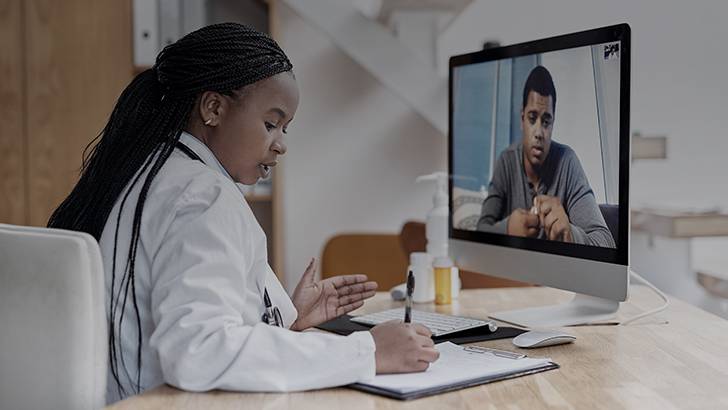As clinicians, we know that adherence to treatment regimens is associated with improved outcomes in our patients with inflammatory bowel disease (IBD). However, many factors can contribute to a patient's nonadherence, and understanding what those factors are, especially in underserved patient populations, is an important category of care that we need to keep in mind. Tune in to hear Dr. Peter Buch speak with Dr. Lea Ann Chen about how we can manage IBD in underserved patient populations.
Understanding IBD in Underserved Populations
Be part of the knowledge.™We’re glad to see you’re enjoying ReachMD…
but how about a more personalized experience?
Understanding IBD in Underserved Populations

Dr. Buch:
Adherence to treatment regimens is associated with improved outcomes in our patients with inflammatory bowel disease, or IBD for short. Many factors can contribute to a patient's nonadherence. Understanding what those factors are, especially in underserved patient populations, is an important category of care that we need to keep in mind, which is why today we'll be discussing just that.
Welcome to GI Insights on ReachMD. I'm Dr. Peter Buch. And joining me is Dr. Lea Ann Chen. Dr. Chen is the 2016 Sherman Prize recipient for her research on underserved patients with IBD. She's also an Adjunct Assistant Professor at NYU Grossman School of Medicine.
Dr. Chen, welcome to the program.
Dr. Chen:
Thank you. It's great to be here.
Dr. Buch:
So, Dr. Chen, would you start us off by discussing the increasing incidence of IBD in the non-white population?
Dr. Chen:
Sure. So this is one of the things that I find very fascinating about IBD, is that the, composition in terms of the populations affected by the disease has really changed in the past few decades. And so IBD is a diagnosis that has been more prevalent in certain parts of the world, so Western Europe, Northern Europe, and countries in North America, such as the United States and Canada, and what we've seen over the past few decades is that there's really been an explosion of the disease in other areas of the world. So now we're seeing more and more inflammatory bowel disease in Central and South America, in the Caribbean a lot more in Asia and so we're really seeing an increase in both the incidence and prevalence of the disease globally.
Dr. Buch:
And what should we know about food insecurity for IBD patients?
Dr. Chen:
Well, unfortunately, I think one of the things that we should know is that it is more common than what we would expect. So there was a great study that was published by Sid Singh and his colleagues fairly recently showing that 1 in every 7 to 8 patients in the United States is impacted by food insecurity. So if you think of the approximately 3 million people with IBD in the US, that's a significant number of patients who not only have to grapple with the challenges of their disease but may have to consider food insecurity in addition to all the other medical costs that they have to deal with.
Dr. Buch:
And that, of course, is reaching just beyond our medical practices to see what else is available in the community, and that's the difficult part here.
Dr. Chen:
Yes, yes. And so, you know, one of the studies, for example, that the Crohn's & Colitis Foundation put out showed that there are quite a number of additional costs for inflammatory bowel disease patients compared to those who don't have the disease, and so what they and other groups have done is to provide resources to help patients navigate the complexities of IBD and a lot of it is online so that it can be available to those who have access to the internet.
Dr. Buch:
And I even have heard of physicians in specialized communities who are, ready for this, prescribing food. It’s already built into their system.
Dr. Chen:
Yes, I mean, it's very difficult for patients with inflammatory bowel disease to manage their symptoms and to manage potential food triggers, and so because the disease can cause deficiencies in dietary absorption of vitamins and other types of nutrition, it's important for everyone to have a healthy diet but especially so for IBD patients, and this is even more so a challenge when patients are food insecure. And so I think that the practice is definitely novel, and I think the rationale is almost common sense that we need to have access to food and healthy foods in order to have healthy bodies.
Dr. Buch:
Many underserved patients have more severe disease on initial presentation. So how can we be involved earlier in their care?
Dr. Chen:
So that is a challenge that we unfortunately see over and over again. I think one important thing is partnering with the primary care providers, who are often times the first individuals who may see a person who might have inflammatory bowel disease. And because underserved patients may not often have the opportunity to see a doctor to get care, each touchpoint is more and more important. And so I think that it's incredibly helpful when we can partner with our primary care docs to make that referral process easier, to make that initial evaluation easier so that patients can get diagnosed and not develop the many potential complications they can have from untreated inflammatory bowel disease.
Dr. Buch:
And then later down the line, how do you handle frequently missed appointments for IBD follow-up?
Dr. Chen:
So one thing that actually has become a little easier during the pandemic is telehealth appointments, and so this has been an opportunity for some IBD patients who can't take time off of work or can't travel to follow up with their docs. Sometimes it's just taking that extra time to call a patient, to hunt them down if they've missed a follow-up appointment, and to try to get them back into the system, but unfortunately, there's so much going on in everyone's lives, and especially, for those who are struggling with financial difficulties and food insecurities, sometimes their IBD appointments and treatments are not at the top of their list, and so anything that we can do as medical providers to make that process a little bit easier I think is incredibly helpful.
Dr. Buch:
For those just tuning in, you're listening to GI Insights on ReachMD. I'm Dr. Peter Buch, and I'm speaking with Dr. Lea Ann Chen about IBD in underserved patient populations.
So, Dr. Chen, if we switch gears a bit and focus on the current climate, what effect has the COVID-19 pandemic had on our underserved patients with IBD?
Dr. Chen:
Yeah, the pandemic has been a real challenge for all of our patients. So hospitals and medical offices have really had to change the way that we, have been delivering care, so doing more things remotely. I think the frequent changes and the occasional surges have also limited availability of not only providers for visits but also limited the number of endoscopies and other diagnostic tests that we can do or that we can do quickly, so there sometimes have been delays. And so we're certainly in a better place now than we were a year ago, but I think there have definitely been challenges for everyone, and this has been compounded for patients who, struggle with financial difficulties. I think the time that it takes for patients to have to come in and do, for example, COVID tests prior to endoscopies and difficulty sometimes with internet connection even to do a telehealth has been a challenge, and so in one way this crisis has been an opportunity for some new innovation to take hold, but at the same time, it's led to a lot of challenges as well for our patients and has led to some fragmentation in their care.
Dr. Buch:
And given everything we've talked about today, Dr. Chen, how do you use culturally appropriate information for your patients?
Dr. Chen:
So I think all of us as providers want to provide care that's culturally appropriate —and we want to speak, to patients in a way that resonates with them, so I think one is just trying to be aware of different cultures and different ways that patients may describe their symptoms, their relationship to various foods, their thoughts about medical care and their interactions with, physicians. But I think the other side of that is that it's difficult to be all things to all people. And so I think one of the things that various medical schools across the country have been working on is promoting diversity in the physician population among our trainees and faculty, etc., because patients do appreciate when they are being taken care of by providers in an environment that understands and respects their culture, and so that is nice to see that push for more inclusion and more diversity in the medical community.
Dr. Buch:
Lastly, are there any other insights you'd like to share with our audience today?
Dr. Chen:
Yes, I think both for patients to know and also for physicians and other providers to know is that there are resources that are available to patients when they are undergoing financial difficulties, and what has become more common of an issue during the pandemic, unfortunately, is these gaps in insurance, gaps in care. And so I wanted to make sure that folks know that there are often patient assistance programs that pharmaceutical companies and other companies provide so that if, for example, a patient loses their insurance, they don’t have to miss their infusions or miss treatments, and sometimes even those who do have insurance but have to deal with very high copays can get reductions in the cost of their medications. And so I really advise both medical professionals and patients to look into these options before any treatments are missed or delayed just because the risk of complications developing in inflammatory bowel disease is a real problem and is something that hopefully we can avoid.
Dr. Buch:
These were all extremely important insights, and I want to thank my guest, Dr. Lea Ann Chen, for educating us today. Dr. Chen, it was a pleasure having you on the program.
Dr. Chen:
Thank you for having me. It's been a joy, and, and thank you so much for your interest in this topic.
Dr. Buch:
For ReachMD, I'm Dr. Peter Buch. To access this and other episodes in this series, visit reachmd.com/giinsights, where you can Be Part of the Knowledge. Thanks for listening, and see you next time.
Recommended
Overview
As clinicians, we know that adherence to treatment regimens is associated with improved outcomes in our patients with inflammatory bowel disease (IBD). However, many factors can contribute to a patient's nonadherence, and understanding what those factors are, especially in underserved patient populations, is an important category of care that we need to keep in mind. Tune in to hear Dr. Peter Buch speak with Dr. Lea Ann Chen about how we can manage IBD in underserved patient populations.

Facebook Comments